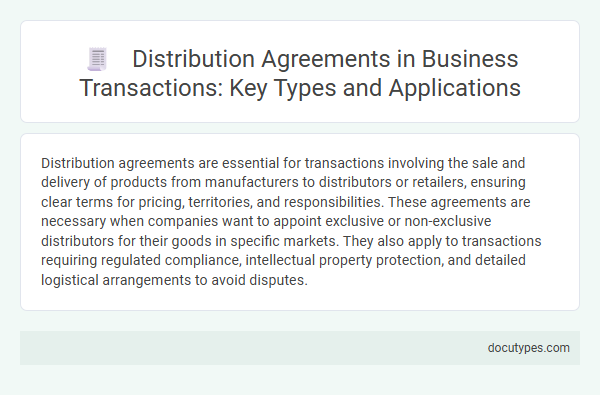Distribution agreements are essential for transactions involving the sale and delivery of products from manufacturers to distributors or retailers, ensuring clear terms for pricing, territories, and responsibilities. These agreements are necessary when companies want to appoint exclusive or non-exclusive distributors for their goods in specific markets. They also apply to transactions requiring regulated compliance, intellectual property protection, and detailed logistical arrangements to avoid disputes.
Introduction to Distribution Agreements
Distribution agreements are essential contracts that outline the terms for distributing products or services from suppliers to buyers. Understanding when these agreements are necessary helps ensure smooth business operations and legal clarity.
- Commercial product sales - Involves the transfer of goods from manufacturers to distributors for resale.
- Exclusive territory arrangements - Grants a distributor sole rights to sell products within a specific geographic area.
- Licensing and franchising transactions - Entails distributing licensed products or services under agreed branding and operational guidelines.
Importance of Distribution Agreements in Business
| Type of Transaction | Reason for Distribution Agreement | Importance in Business |
|---|---|---|
| Wholesale Transactions | Ensures clear terms for bulk product sales between manufacturers and distributors. | Protects both parties by defining pricing, delivery, and responsibilities, reducing disputes. |
| Exclusive Distribution | Grants sole rights to distribute a product within a specific territory or market segment. | Secures market control, builds brand loyalty, and enhances distributor motivation for sales growth. |
| International Sales | Regulates cross-border product distribution to address local laws, taxes, and customs. | Facilitates smooth market entry and compliance, reducing legal and logistical risks. |
| Online and E-commerce Distribution | Establishes conditions for selling products through digital platforms and marketplaces. | Controls brand representation, pricing policies, and customer service standards online. |
| New Product Launch | Defines roles and timelines for distributing newly introduced products. | Aligns marketing efforts and distribution channels to maximize market penetration. |
| Franchise or Licensing Agreements | Integrates distribution rights within broader franchise or licensing contracts. | Ensures consistency and legal protection across multiple locations or licensees. |
Distribution agreements serve as foundational contracts that clarify the terms of product distribution, safeguard your interests, and promote healthy business relationships. Their importance cannot be overstated in transactions involving physical goods, intellectual property, or exclusive sales rights.
Key Elements of Distribution Agreements
Distribution agreements are essential for transactions involving the sale or resale of products through intermediaries such as distributors, wholesalers, or retailers. Key elements include the scope of distribution rights, geographical territory, and duration of the agreement. Other critical components cover pricing terms, delivery obligations, intellectual property usage, and termination conditions.
Types of Distribution Agreements
Distribution agreements are essential for defining the terms between suppliers and distributors across various types of transactions. These agreements ensure clarity in responsibilities, territories, and compensation structures.
- Exclusive Distribution Agreements - Grant exclusive rights to a distributor to sell products within a specific territory or market segment.
- Non-Exclusive Distribution Agreements - Allow multiple distributors to sell the same products without territorial restrictions.
- Selective Distribution Agreements - Limit distribution to authorized dealers who meet specific criteria, ensuring brand reputation and product quality.
Choosing the appropriate distribution agreement depends on the nature of the product, market strategy, and desired control over distribution channels.
Exclusive vs. Non-Exclusive Distribution Agreements
Transactions involving the sale and distribution of products or services often require a distribution agreement to define the terms between manufacturers and distributors. Exclusive distribution agreements grant a single distributor the sole right to sell within a specific territory, enhancing market control and brand consistency. Non-exclusive distribution agreements allow multiple distributors to operate in the same area, promoting wider market reach but reducing individual distributor control.
Selective Distribution Agreements
What types of transactions require a selective distribution agreement? Selective distribution agreements are essential for transactions involving high-end or branded products where control over the distributor network ensures brand integrity and quality. Your selective distribution agreement sets clear criteria for authorized distributors, helping maintain product exclusivity and customer trust.
Franchise and Agency Distribution Models
Distribution agreements are essential in facilitating transactions where products or services need to be marketed and sold through third parties. Franchise and agency distribution models represent two common types of transactions requiring such agreements to clearly define roles, responsibilities, and revenue sharing.
Franchise distribution models involve granting the franchisee rights to operate under the franchisor's brand, often including supply chain and marketing support. Agency distribution models appoint agents to sell products on behalf of the principal, with commissions based on sales, necessitating formal agreements to govern the relationship.
Legal Considerations in Distribution Agreements
Distribution agreements are essential for transactions involving the transfer of goods or services from a supplier to a distributor. These agreements outline the rights and responsibilities to ensure clear terms of sale and distribution channels.
Legal considerations in distribution agreements include defining territorial rights, exclusivity clauses, and payment terms. You must ensure compliance with applicable trade laws, intellectual property protections, and dispute resolution mechanisms. Proper drafting minimizes risks related to breach of contract and enforces accountability between parties.
Common Challenges in Drafting Distribution Agreements
Distribution agreements are essential for transactions involving the sale and delivery of goods or services through third-party distributors. Drafting these agreements often presents challenges that can affect the clarity and effectiveness of the contractual relationship.
- Ambiguity in Territorial Rights - Unclear definitions of geographic or market boundaries can lead to disputes over distribution areas and exclusive rights.
- Discrepancies in Payment Terms - Inconsistent or vague payment schedules and commission structures may cause financial misunderstandings between parties.
- Insufficient Termination Clauses - Lack of detailed termination conditions can result in prolonged conflicts and difficulties in contract conclusion.
What Types of Transactions Require a Distribution Agreement? Infographic

